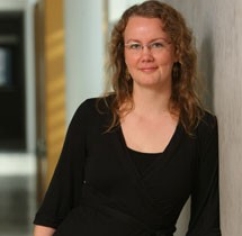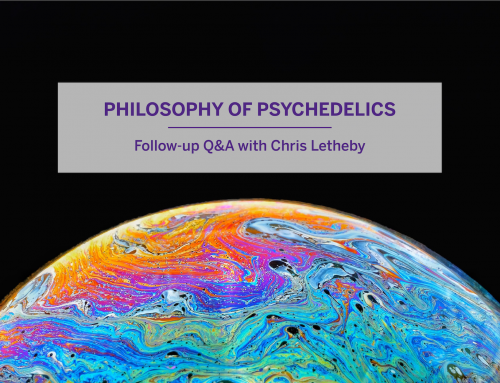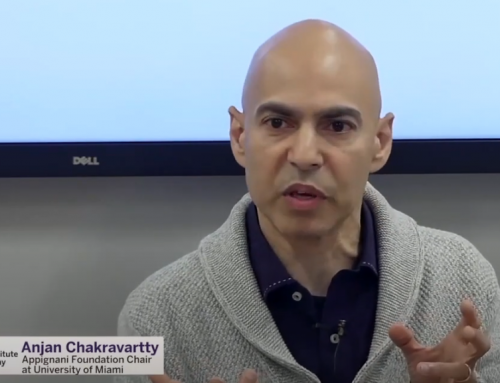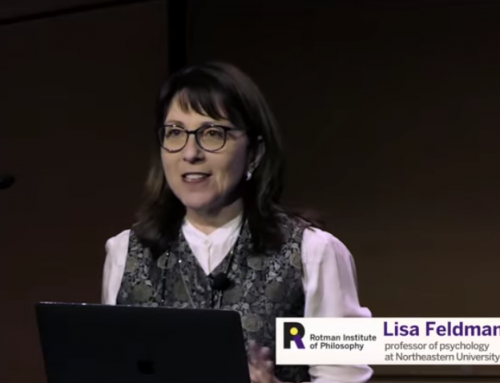by Veromi Arsiradam
Dr. Kirstin Borgerson is Associate Professor of Philosophy, Cross-Appointed with Gender and Women’s Studies, at Dalhousie University. Her main areas of research include philosophy of medicine, bioethics, feminist philosophy, and social epistemology.

On January 29, 2016, Dr. Borgerson delivered a lecture titled, “Toward an Epistemic Justification for Research-Practice Integration in Medicine,” as part of the Rotman Institute of Philosophy speaker series. An abstract and video for her talk can be found here. Before her lecture, Dr. Borgerson sat down with me for an interview.
Veromi Arsiradam: Thank you for taking the time do this interview, Dr. Borgerson. Welcome to the Rotman Institute of Philosophy and the Philosophy Department. Your work is in the intersection of philosophy and medicine, and you have written extensively about medical research, clinical trials, evidence-based medicine, and research ethics.
VA: How would you characterize your work?
Kirstin Borgerson: I think of myself as a philosopher of medicine. Philosophy of medicine includes bioethics/medical ethics, which people are pretty familiar with, but it’s broader than that. It also includes medical epistemology and metaphysics, and even social and political issues in medicine. I’d love it if more people who were interested in medical ethics engaged more broadly with other areas of philosophy. I have this idea that, really, bioethics as a field should be reconceived as philosophy of medicine, and it should include metaphysics, epistemology, logic, ethics, all of that, but we have some way to go before we get to that scenario, I think. My research is primarily at the intersection of epistemology and ethics in medicine, so I worry a lot about how medical knowledge is produced, and what happens when this process goes wrong. Lately, this has meant that I spend a lot of time thinking about how researchers might produce evidence in such a way that they reduce harm to patients.
VA: What are some problems with clinical research?
KB: Oh my, there are so many problems! One problem is that there is extensive bias throughout medical research and yet the results of that research are often presented as completely objective, and so those biases end up being hidden. In particular, one thing that worries me is the tendency for some researchers to design their trials to get the results they want. They are not engaged in genuine scientific investigation. Instead, whether motivated by their own ego or financial interests or whatever else it may be, they design a trial that actually gives them the results that they know they want from the beginning. So, if they know they want a treatment to be effective, they can rig the trial in such a way that they get the results that they want.
Another big problem is that, if researchers don’t get the results they want, they can simply choose not to publish the results. Publication bias is rampant and absolutely inexcusable. Physicians looking at the published research record think that a treatment works, but they don’t know about the studies that show that the treatment was not effective. The result is that patients are harmed by ineffective treatments. Another problem is that there is a failure to do a literature search before conducting research, which leads to unnecessary replication of studies, and exposes patients in those studies to unnecessary risks. Yet another problem is a tendency to design studies that are too small to actually answer the question being asked or end up being underpowered because researchers can’t recruit enough people. So we have a huge number of studies that are done that are just not capable of answering the questions they set out to answer. So, those are just a few of the problems out there!
VA: Randomized control trials (RCTs) were once the gold standard for medical research. Has the significance of RCTs shifted over the years?
KB: RCTs are still considered the gold standard. A key contribution of the evidence-based medicine movement, in my view, was this idea that the RCT is the very best method. It’s the one researchers should aspire to and the one physicians should look to when they search for evidence to inform treatment decisions. I think that the idea that the RCT is the gold standard is very common now, and that’s because of the dramatic success of EBM as a movement. I think it is quite common to think of the RCT as the only research method that gets at real causes and is truly objective. Both of these claims are highly problematic, of course.
I think if you’re a clinical researcher it is good for you to have RCTs in your toolkit, but you also want to have a bunch of other tools: case-control studies, case series, cohort studies, different forms of qualitative research, and all sorts of other things as well. My colleague Robyn Bluhm has an even better way of putting this: instead of ranking methods in a hierarchy of evidence, think instead of having a network of evidence. In such a network, the key is finding all these sources of evidence and using them as appropriate, instead of thinking that there’s one best method that we should be aspiring to all the time. I think that’s exactly the way to think about the use of RCTs. They’re certainly still useful, but they’re not the only thing we should be doing. Unfortunately, this view is not very widely held.
VA: You have written about EBM, evidence-based medicine. What questions are at the core of discussions about EBM?
KB: Interestingly enough, one of the core questions is “What is it?” I wrote a PhD thesis critiquing EBM, and of course, one of things you have to do early on is define your terms. It seemed that no matter what account of EBM I chose, I would be critiqued for not having picked the right one. This was a way to constantly undermine any kind of argument against EBM. Nailing down what it is is important for the critical project and yet is something that is really hard to do because there are so many forms of EBM out there. I think that there are some people who think that EBM is just the idea that clinical practitioners should pay attention to research evidence, and that their answers about medical questions should refer to evidence. But I think it’s more than that, and its biggest proponents think so, too – EBM must have at its core this idea of a hierarchy of research methods. So you have the RCT at the top and then everything else underneath, and without that there isn’t enough content in EBM to say it’s really anything at all. And then, if you take that specification seriously, that there’s a hierarchy of evidence, and you critique that, EBM starts to fall apart.
VA: In your article, “Why Reading the Title Isn’t Good Enough: An Evaluation of the 4S Approach to Evidence-Based Medicine”, you write about the influence of biases in medical research and propose solutions for mitigating their effects. I’m wondering if you can tell us more about that.
KB: There is an idea that science is value-free, and I think that philosophy of science has done a really nice job in showing that this is false. Science is not value-free; there are values all over the place in science, and one of the things we can do to deal with some of the problematic values influencing science is start acknowledging them. Then we can subject those values to scrutiny. If someone has a financial interest in obtaining a particular result in a study, for instance, and they are the one who is going to be directly involved in designing and directing that study, which puts them in a pretty obvious conflict of interest position, is that a problem or not? We need to confront those sorts of scenarios head-on by acknowledging that they exist and then having a general discussion within the community about whether we think that’s good for the production of knowledge. I’d like to see more of those conversations happening. We can and should be able to say no to some of these practices, but that should emerge out of community discussions about what we think it takes to produce knowledge.
VA: How does feminist philosophy influence your work?
KB: I think the biggest influence in my work is through feminist epistemology. When I’m approaching the problems with clinical research, I’m consciously or subconsciously drawing on critical contextual empiricism, which is a type of feminist epistemology. I’m drawing on the insights of that approach to help propose solutions for some of these problems. When I say, for instance, that community members should have a more active discussion about the biases that are influencing research in their domain, I’m drawing on work in feminist social epistemology. It says that in order to produce knowledge a community must have certain social norms in place. One of those norms is that community members must actively encourage critical discussion, particularly about hidden background assumptions. We need a diverse community engaged in that discussion, people need to be on an equal playing field, and people have to be responsive to that criticism. A lot of solutions that I propose come from this feminist work, particularly work done by Helen Longino. That’s the most direct and obvious connection with feminist philosophy in my work.
VA: This next question has to do with your talk this afternoon. What is research-practice integration in medicine, and why should we pursue arguments in its favour that are epistemic, as well as ethical, political, and pragmatic?
KB: Probably for most of the history of Western medicine, the closest thing we can think of to research, which would have been experimentation on individual patients, would have been happening at the same time as clinical practice. These two activities would have been intimately related to each another: practicing doctors would have been trying out new treatments on patients and seeing what worked. In that sense, practice-as-usual involved a kind of experimentation. In the 20th century, research became more systematic and researchers started enrolling human subjects in their trials. And as we all know, there were a series of research abuses that took place: researchers weren’t getting consent, they were targeting vulnerable subjects like prisoners and impoverished people, and so on. All sorts of terrible things were done in the name of science in the 20th century. Of course, these abuses eventually come to light, and citizens of nations around the world made it very clear that researchers needed to stop doing these experiments and governments needed to put some rules in place. So bioethicists, among others, sat down and decided that in order to regulate research, to put some ethical rules in place, we needed a clear distinction between research and practice, as a way to apply a set of rules to research and avoid abuse of research subjects. We see this division happening in the 1970s and ever since then the field of bioethics has been divided into research ethics and clinical ethics. So there is a strong tradition of separating research from practice, and there are different rules that are thought to apply in each of these two domains.
That brings us to the last ten years or so. What we’re seeing now, largely because of improvements in information technology, are a lot more activities that are being done in the medical context that are not clearly either research or practice. For instance, because we have a lot of data being produced through electronic patient records, we also have more effort dedicated to analyzing that data. Is that research? Well, it was just practice, and we gathered data, but now we’re doing data analysis.
Or let’s imagine, for example, the case of a hospital administrator who engages in some quality improvement measures, perhaps surgical checklists. We have good evidence from other contexts that surgical checklists will reduce adverse events such as infection rates in surgery, which is a common source of adverse events in hospitals. So they bring in these surgical checklists, and they roll them out and they try them for a year. And when they compare rates of adverse events to the previous year, they find that the rate of adverse events decreased significantly. They’ve learned something, but they’ve learned something just by instituting some new, fairly widely-accepted practice. So is that research or is that practice? Well, it’s a little of both, and it’s not clear which. What if they publish the results? Is it research then? There are more and more of these sorts of activities that don’t fit neatly into the two boxes.
One of the terrible things that’s been happening is that when people don’t want to go through the research oversight process, because it’s so onerous and time-consuming, they’ll do things to try to make what they’re doing seem less like research so they can avoid having to go through that process. So they’ll do things like not systematically track outcomes, or not report the data gathered back to the medical community (because dissemination of results looks a lot like research). The incentives line up to produce worse research and probably worse patient care.
As more and more of these tough cases arise, we have a practical argument to revisit the research-practice distinction and think harder about what research-practice integration might look like, and while we’re at it, what we’re going to do about the ethics of these grey-zone cases. That’s a practical reason to look into research-practice integration. In the bioethics literature, one group of researchers at Johns Hopkins has offered an ethics framework that’s meant to cover this new integrated approach, and it’s highly justice-driven. They’re offering an ethical-political argument for this sort of shift. They think that greater integration is going to lead to, among other things, greater health equity.
So, there are practical and ethical-political reasons in favour of research-practice integration. What Robyn Bluhm (co-author) and I were interested about were the epistemic arguments for integration. Is it the case that when we bring research and practice together, so that we’re conducting research on practice seamlessly with the unified goal of providing excellent care to the particular patient and producing knowledge for future patients, we get better knowledge? We think we do gain better knowledge in an integrated system so that becomes another argument in favour of moving in the direction of integration.
But, I will say, this is going to cause some serious problems for bioethicists because there is this idea that there are two domains with different ethical rules, and if these are collapsing together, then which activities should be subject to ethics review before they occur and which ones shouldn’t? Now we have an open question. We can’t just say the ‘research’ activities because we don’t know which ones those are exactly. So it will cause problems for bioethics, but they’re really interesting problems, and I think it’s still the right way to go. Providing the epistemic argument is meant to complement the other arguments that are out there and help to give more reasons in support of moving in the direction of greater integration.
VA: How have bioethics and philosophy enriched medicine? Is the value of philosophy recognized by those in the medical field?
KB: I’ll start with the second part first. When I started my PhD project, in which I was critiquing evidence-based medicine, people would say things like, “Well, surely the medical doctors and other health professionals hate you; they must be so frustrated that some outsider is coming into their domain and criticizing how things are done.” And actually, my experience had been the exact opposite. When I presented my work to various interdisciplinary audiences, which I had the good fortune to do quite often, doctors would come up to me afterward and say, “We’re so glad that somebody is looking at this. This is a really serious issue and there isn’t enough attention paid to it. Let me tell you about my frustrations with EBM…” So, my sense during that project was that, even though I was saying stuff that was quite critical, people in the medical domain were actually quite keen to see people engage with those questions. For the most part, I’d say that’s been my experience of the relationship between the two domains. Not always, of course! But most of the time.
The first question is tricky. I think that a lot of researchers’ experience with bioethics comes only through encounters with research ethics oversight, and this is often a bad experience. Ethics review is something that seems to slow down their research and perhaps even seems unnecessary, from their perspective. Maybe they don’t think that people on the committees are qualified to be assessing their work, or they believe that as long as they are good people their research should be regarded as ethical. (And there are other concerns, too.) So there’s a certain amount of resentment toward bioethicists because they are affiliated with research ethics boards. I certainly encounter people who have that reaction to discussions of ethics. So the perception is that bioethics doesn’t enrich medicine: it is merely an obstacle.
So, what can be done about this? When I’m teaching, especially when I teach an ethics and science class to first-year science students who are hoping to pursue a career in science, one of the things I work very hard on is helping them to appreciate how important ethics is to good science. I spend the entire semester coming back to that message over and over again, in the hope that the next generation of researchers understands why that ethical oversight exists and why it shouldn’t be viewed as something imposed from outside, but rather a natural part of the scientific process. So, education is one solution.
The other solution to the PR problem for bioethics is to take the criticisms seriously and make changes to the way research ethics is conducted. Some of the criticisms raised by researchers identify real and serious problems with current ethics oversight, and the appropriate response in those cases is change to those policies. This sort of change might come about as a result of this research-practice integration and new models of ethics oversight, so maybe there’s some hope there, too.
VA: What initially sparked your interest in philosophy and, specifically, topics in bioethics and philosophy of medicine?
KB: When I started university I thought I wanted to be a scientist. I didn’t know what kind of scientist, though, so I took a variety of science courses during my first two years of undergraduate study, from physics to biochemistry to astronomy. Then, just out of interest, I signed up for an environmental ethics class and I had a professor (who has since retired) who was, I think in retrospect, actually a pretty terrible teacher. But he did one thing that was very interesting: he would go around the classroom and challenge everybody to say what they thought about some controversial topic. It was often not related to the course material at all. So he would go around the room and relentlessly critique everyone’s positions, and as he was going around the room the first time, I was thinking, “Okay there’s something that he believes, which he’s trying to elicit from his audience, and he’s going to critique everybody who he thinks is wrong until he finds someone who gives him the right answer.” So, being a good student, I tried to figure out what the right view was. At a certain point he had critiqued every position I could think of and I realized that I had misunderstood the point of the exercise. We were meant to give reasons in support of our position and he wanted us to exercise our ability to respond to a critique of that position. It’s not that there wasn’t some view he thought was best (he definitely had strong views on all sorts of issues), but he wanted us to practice defending our own position. He also wanted us to realize when our reasons simply weren’t up to the task of supporting our views, which was often the case for students in the class. In those cases, we were meant to feel compelled to adjust or change our position. I loved that exercise – though he lost a lot of students by doing it! – and so that was the start of philosophy for me.
My interest in bioethics stemmed from my more general interest in applied philosophy. There are a lot of problems in the world, and bioethics is one applied area in philosophy where you see the effects of all the theorizing quite directly. There is at least some hope that your solutions might have a real effect on the world. So, as cheesy as it sounds, I’d like to help make the world a better place, even if only in some small way, and that’s why bioethics and more applied topics in philosophy have always been very attractive. At their best, they blend theoretical rigor with real-world significance.
VA: What advice would you give to philosophy students, and medical or aspiring medical students?
KB: The people I encounter the most frequently who are headed to medicine are undergraduate students who are half-way through their degree and are thinking about medicine down the road. What I say to them is that philosophy can be incredibly helpful to you as a prospective medical student and then eventually as a physician. You might not even fully come to appreciate the ways in which it’s valuable to you for a few years, but some of the core skills you’re going to need as a physician are: the ability to think critically through the evidence that you’re going to be given, an ability to listen to other people and to hear what their problems are, an ability to identify what people’s values are, and an ability to engage with patients and colleagues respectfully but also critically. I think those are skills gained in philosophy. If I could change one thing about the way medicine is being practiced right now on the clinical side, I’d like to see better communication. I think that communication between physician and patient is very poor, and what this means is that, in practice, informed consent is achieved very rarely. I think physician-patient communication would benefit tremendously from precisely the skills students gain in their philosophy and other humanities courses.
More specifically, for undergraduate students, my advice would be to not specialize too soon. Bioethics problems are really fascinating and you want to dive into them immediately, but sometimes building up your strength in other areas of philosophy first and coming to those questions later is a good way to go. Let yourself try out all sorts of different areas in philosophy. In keeping with my interests in philosophy of medicine generally, one of the things I would love to see is people coming to bioethics with backgrounds in other areas of philosophy. It would be great if more people got really interested and became experts on, for instance, political philosophy, and then in their PhD or even later, in a postdoc position, shifted into bioethics. I know several colleagues who did this, and they are some of the best bioethicists I know. This is because the strong foundation and training in another area of philosophy enables greater awareness of the interaction between, for instance, ethical issues and political structures or ethical issues and epistemic assumptions. I suppose this is biased to my own experience: I was trained in philosophy of science, philosophy of medicine and social epistemology, and that training is enormously helpful for me when I’m facing problems related to the ethics of medical research. So, perhaps you should ignore me and find your own path! But that caveat should be attached to any advice given to anyone.
For graduate students who are already in a PhD program, I think I’d stick with roughly the same advice: develop general philosophy skills and bring them in, instead of moving too quickly into bioethics. But it’s a fascinating area, and if you’re a smart, motivated, capable philosopher, then come join us in bioethics (or philosophy of medicine) because you can help to make the field better.
VA: Thank you very much, Dr. Borgerson, it was a pleasure to interview you!
Watch Dr. Borgerson’s lecture on the Rotman Institute of Philosophy YouTube channel.





